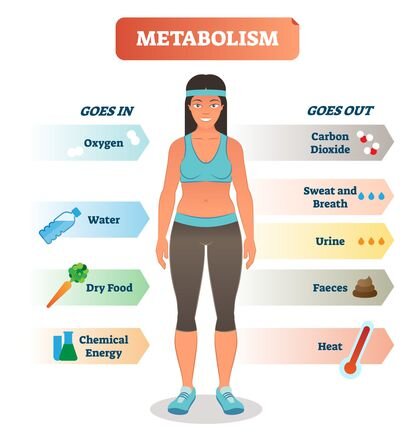
image credit: Chicago Tribune
Enzymes break down carbohydrates into simple sugars, proteins into amino acids and fats into fatty acids. The compounds are absorbed into the blood and distributed to the body’s cells. Our body uses the energy from food to regulate functions such as breathing, body temperature, brain function and circulation. The Basic Metabolic Rate (RMR) is the amount of calories that each person needs for these basic functions. The endocrine system controls the rate and direction of metabolism. The thyroid gland and pancreas secrete hormones that determine how fast or slow the chemical reactions of metabolism take place in our body.
A common misconception related to obesity is that it’s due to a slow metabolism. The truth is, most overweight individuals do not become that way because of a slow metabolism. In fact, studies have shown that obese individuals burn more calories than lean individuals because their bodies need more energy to function. People gain weight because of poor eating habits and low levels of activity. In extremely rare cases, hormonal disorders will slow the metabolism to levels well below normal, causing excessive weight gain. While it’s true that some individuals have a genetic disadvantage that causes them to gain more fat than average individuals, the genes do not cause the fat gain; poor eating habits and inactivity cause fat gain. The key to maintaining proper weight is making healthy eating decisions and controlling portion size.
Age is another misconception with slow metabolism, but this is due to a loss of muscle and not a natural slowing of the metabolism. Lean muscle burns more calories than fat and as we age, we tend to workout less. Regardless of your body composition, there are several ways to increase your metabolism naturally.
• Eat, small frequent meals. When you go a long time in between meals, your body decreases your metabolism to conserve energy and prevent starvation.
• Drink ice water. Calories are burned warming the water to body temperature.
• Interval training. Interval training increases your RMR for the following 24 hours due to post-exercise oxygen consumption.
• Weight training. Muscle burns more calories than fat.

